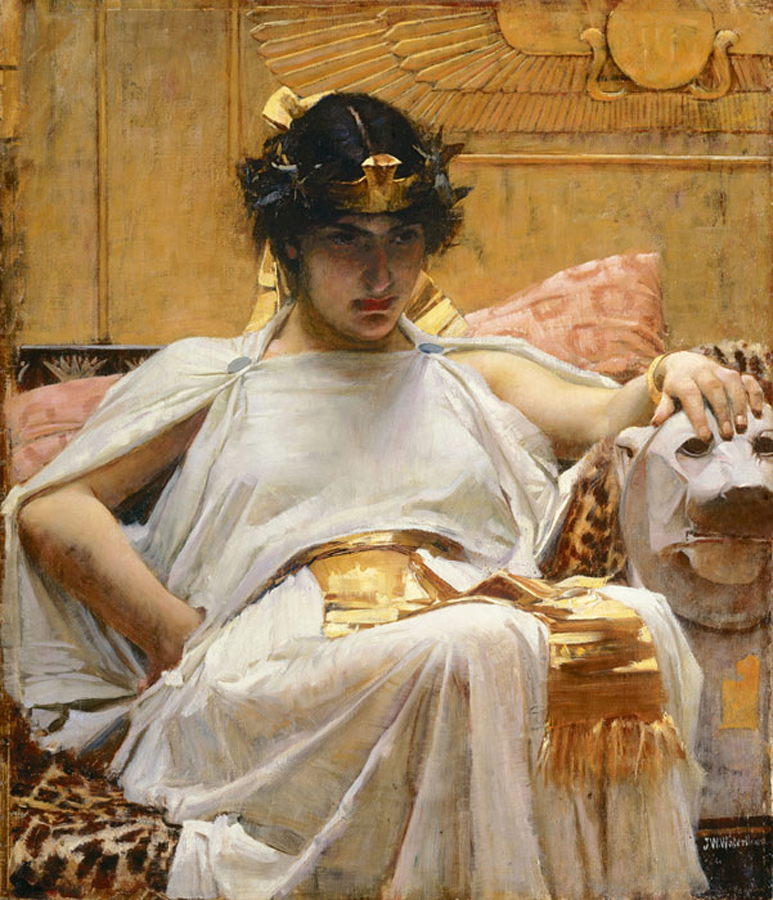Previously on Death of Antony and Cleopatra. And now Henry George Liddell.
Time: August 30 BC
Place: Alexandria, Egypt
Off Mylae, a place famous for having witnessed the first naval victory of the Romans, Agrippa encountered the fleet of Sext Pompeius; but Sextus, with the larger portion of his ships, gave Agrippa the slip, and sailing eastward fell suddenly upon Octavian's squadron off Tauromenium. A desperate conflict followed, which ended in the complete triumph of Sextus, and Octavian escaped to Italy with a few ships only. But Agrippa was soon upon the traces of the enemy. On the 3d of September Sextus was obliged once more to accept battle near the Straits of Messana, and suffered an irretrievable defeat. His troops on land were attacked and dispersed by an army which had been landed on the eastern coast by the indefatigable Octavian; and Sextus sailed off to Lesbos, where he had found refuge as a boy during the campaign of Pharsalia, to seek protection from the jealousy of Antony.
Lepidus had assisted in the campaign; but after the departure of Sextus he openly declared himself independent of his brother triumvirs. Octavian, with prompt and prudent boldness, entered the camp of Lepidus in person with a few attendants. The soldiers deserted in crowds, and in a few hours Lepidus was fain to sue for pardon, where he had hoped to rule. He was treated with contemptuous indifference, Africa was taken from him; but he was allowed to live and die at Rome in quiet enjoyment of the chief pontificate.
 |
| Cleopatra by John William Waterhouse, 1888.
Public domain image from Wikipedia.
|
Hitherto Octavia had retained her influence over Antony. But presently, after his last interview with her brother, the fickle triumvir abruptly quitted a wife who was too good for him, and returned to the fascinating presence of the Egyptian Queen, whom he had not seen for three years. From this time forth he made no attempt to break the silken chain of her enchantments. During the next summer, indeed, he attempted a new Parthian campaign. But his advance was made with reckless indifference to the safety of his troops. Provisions failed; disease broke out; and after great suffering he was forced to seek safety by a precipitate retreat into the Armenian mountains. In the next year he contented himself with a campaign in Armenia, to punish the King of that country for alleged treachery in the last campaign. The King fell into his hands; and with this trophy Antony returned to Alexandria, where the Romans were disgusted to see the streets of a Graeco-Egyptian town honored by a mimicry of a Roman triumph.
For the next three years he surrendered himself absolutely to the will of the enchantress. To this period belong those tales of luxurious indulgence which are known to every reader. The brave soldier, who in the perils of war could shake off all luxurious habits and could rival the commonest man in the cheerfulness with which he underwent every hardship, was seen no more. He sunk into an indolent voluptuary, pleased by childish amusements. At one time he would lounge in a boat at a fishing party, and laugh when he drew up pieces of salt fish which by the Queen's order had been attached to his hook by divers. At another time she wagered that she would consume ten million sesterces at one meal, and won her wager by dissolving in vinegar a pearl of unknown value. While Cleopatra bore the character of the goddess Isis, her lover appeared as Osiris. Her head was placed conjointly with his own on the coins which he issued as a Roman magistrate. He disposed of the kingdoms and principalities of the East by his sole word. By his influence Herod, son of Antipater, the Idumaean minister of Hyrcanus, the late sovereign of Judea, was made king to the exclusion of the rightful heir. Polemo, his own son by Cleopatra, was invested with the sceptre of Armenia. Encouraged by the absolute submission of her lover, Cleopatra fixed her eye upon the Capitol, and dreamed of winning by means of Antony that imperial crown which she had vainly sought from Caesar.
While Antony was engaged in voluptuous dalliance, Octavian was resolutely pursuing the work of consolidating his power in the West. His patience, his industry, his attention to business, his affability, were winning golden opinions and rapidly obliterating all memory of the bloody work by which he had risen to power. He had won little glory in war; but so long as the corn fleets arrived daily from Sicily and Africa, the populace cared little whether the victory had been won by Octavian or by his generals. In Agrippa he possessed a consummate captain, in Maecenas a wise and temperate minister. It is much to his credit that he never showed any jealousy of the men to whom he owed so much. He flattered the people with the hope that he would, when Antony had fulfilled his mission of recovering the standards of Crassus, engage him to join in putting an end to their sovereign power and restoring constitutional liberty.
Continued on Sunday, April 12th. More information on Marc Antony from History.com, on Cleopatra from The Smithsonian and National Geographic Magazines.
No comments:
Post a Comment